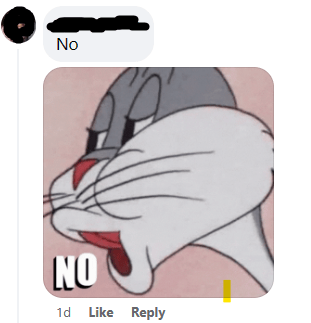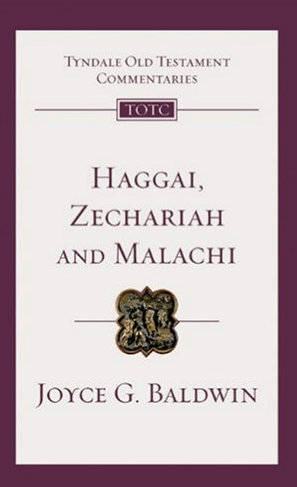Spoiler alert – Bugs Bunny and I don’t see eye to eye on this one!
In March, Logos placed a joyful announcement on their Facebook page, featuring Bible commentaries written by “women who wield words for God’s glory.” Out of the ones they highlighted, I had just used Karen Jobes’s commentary to help translate a passage in 1 Peter, to great benefit; not to mention the help I have gotten from her world-class material on the Septuagint.
There were a number of positive comments, there were 84 “likes or loves”. On the other hand, 12 were negative: either HaHa, Angry, or Crying Tears.
 Not to mention negative comments, which typically were brief and dismissive. At least I thought that’s what they were! Social media lingo is opaque, and sometimes doubly and triply ironic. Some examples:
Not to mention negative comments, which typically were brief and dismissive. At least I thought that’s what they were! Social media lingo is opaque, and sometimes doubly and triply ironic. Some examples:
- “Logos has gone liberal!”
- “No more Logos for me.”
- One conceded that, sure, women are equal to men as believers, “but it doesn’t mean they can write”. (I had no firm idea what this meant, but responded, “Well, let’s begin with Jane Austen!”)
- Another announced that Logos was now definitely “cringy woke.” When I conceded to him that I have only recently been reintroduced to 21st century US culture, I asked: what exactly is “cringy woke” (is cringy like admitting “I’m a snowflake” about a thing?) The answer I got was, “Well, it means to be ‘obsessed with gender and race’”. I responded that Logos hardly strikes me as being obsessed, but it didn’t get through: “cringy woke” is one of those dialogue-stopping phrases that does not invite definition. Let alone refutation.
And then there were:
And even Bugs Bunny got into the act:
I left a comment:
Sorry to see this! Here is this beautiful announcement about how sisters in Christ lead people to love and understand God’s Word. And so many comments post negative emojis (the lowest form of discourse) or reject the whole thing either because mentioning the authors’ sex is caving in to the world, or “woke” (an adjective I can’t seem to get people to define for me. A hashtag, rather, designed to stop any serious reflection).
Historical fact: up until a few decades ago, women were not even allowed to take advanced studies in exegesis in evangelical seminaries. Because they were female.
Yet another fact: I can remember that not many years ago, when women attended meetings of the Evangelical Theological Society, they were commonly asked, “Ah, you must be here with your professor husband…? Who is….?”
Another historical fact: when I took my doctorate in the 1980s, hardly any women were taking advanced studies. The fact that women my age or even older are now publishing commentaries is a wonder to behold, a cause to thank God.
I will go further and say: if men were not allowed to take doctoral studies until the 1980s, and just now were coming out with commentaries, and Logos announced, “Isn’t this wonderful? MEN are publishing commentaries!” I doubt that anyone would label this “woke” (that # again) or twisted by culture. We would shout out, “Attaboy!”
If anyone is curious, I changed my mind about women and the Scriptures about 30 years ago. My hand on my heart, I did so because of what I saw in the Bible itself. You might think that I misinterpreted the Bible or was giving way to culture (a river all of us swim in, whether conservative or liberal!); or that now that we have let the camel’s nose in the tent, things must go from bad to worse (“Give way on the issue of women commentators today, and the creek will rise and the terrorists will win!”). Please accept that I find the exegetical basis of much “complementarian view of women in ministry” is slim, and rests on one possible (not necessary) interpretation of a tiny sliver of Bible texts, maybe 10 verses at most. Out of 30,000+.
My opinion may be wrong of course – I sincerely hope that God will guide me in yet another direction if I am mistaken.
Time machine time: Let’s go back some decades, to an experience I had while much younger and still at university. I was at a conference at Tyndale House in Cambridge and looking over some volumes of their (very useful) Tyndale Bible Commentary series.
I saw that a certain “Joyce Baldwin” had penned the volume on Haggai, Zechariah and Malachi.
Stunned.
I later learned that the technical term for my discomfort is “cognitive dissonance” – that uncomfortable feeling one gets by trying to reconcile two assumptions which, to all appearances, must contradict one another. A great example: Harold Camping’s followers, who were absolutely certain the Lord would return in 2011; but then he did not. (CLICK HERE). Mercifully for my heart, only later did I see that Dr. Baldwin had written four of the Old Testament volumes, the one I first saw and also the volumes on 1-2 Samuel, Esther, Daniel.
Because cognitive dissonance is a distressing state of mind, people move quickly to flee from it. In my case I was trying to juggle these two opposing “truths”: (1) everyone knows a woman cannot write a Bible commentary, versus (2) yet here is a woman writing a Bible commentary. In order to alleviate my angst – and I promise you, I am not making this embarrassing story up – I clung to the following solution:
“Okay, so, perhaps in Britain ‘Joyce’ is a name that could be used by a man, whereas in America the other boys would tease you for it. So, it must be one of those not-so-masculine-sounding names that men sometimes have. Names like ‘Marion’ (John Wayne’s original name) or Leslie (Gerald Ford’s birth name) or Carol or Avery or Kelly or Ashley. [ChatGPT assures me that Joyce can in theory be a man’s name but couldn’t come up with any examples.]
So, I more or less expected that at some Tyndale conference, a big beefy Englishman named Dr. Baldwin would come up to me and say, “Hi Gary, no titles please, just call me Joyce”.
I wasn’t going to get away that easily.
Turns out Joyce really was a woman, one of the leading evangelical Old Testament scholars of the 20th century. Our paths almost certainly crossed, but I don’t remember if I met her. Wikipedia has a brief article on her life and work. Joyce Baldwin – Wikipedia. In his Old Testament Commentary Survey, Tremper Longman called her a “balanced and sane exegete” – high praise.
It took me several years more – and my own study of Scripture – to replace one belief with another, and to rejoice to see evangelical sisters in Christ doing major scholarly work in God’s Word. Cognitive dissonance melted away when I came to doubt the first premise, that “everyone knows a woman cannot write a Bible commentary.” If I swap that out for, “Some evangelicals believe a woman should not write a Bible commentary, but I do not believe that”, then my mind returns to its usual tranquil state.
Women who are penning such works today are only the first fruits of godly studies by evangelical, Bible-teaching, descendants of godly Priscilla, the woman who was half the team that taught the mega-learned Apollos. And neither Apollos, Aquila, Paul, or Luke the author of Acts is on record as rejecting her teaching ministry because of her sex.
I concluded my comment: “How about we label this, not liberalism, but ‘honoring the Lord who poured his Spirit on his maidservants?’ It’s more biblical and it appears in both Joel and Acts.”
“Women explore God’s Good News. THAT’S Good News. Isn’t it?” by Gary S. Shogren, Professor of New Testament, Seminario ESEPA, San José, Costa Rica





Thank you, Gary, yet again a thoughtful, educated, examination of Christian controversy. Another scholar recently pointed out to our small Bible study group that Luke continually refers to women in ministry throughout Luke and Acts right along with the men.
Thank you very much! I have been majorly impressed by the role of women ministers of Christ in Romans 16:1-15 as well. Blessings, Gary
Gary, What is the best book on this issue in your opinion. Dennis
Dennis, hi! I’m afraid I’m a bit behind on secondary sources. I would start, however, with the 2nd edition of Discovering Biblical Equality: Biblical, Theological, Cultural, and Practical Perspectives. Blessings!